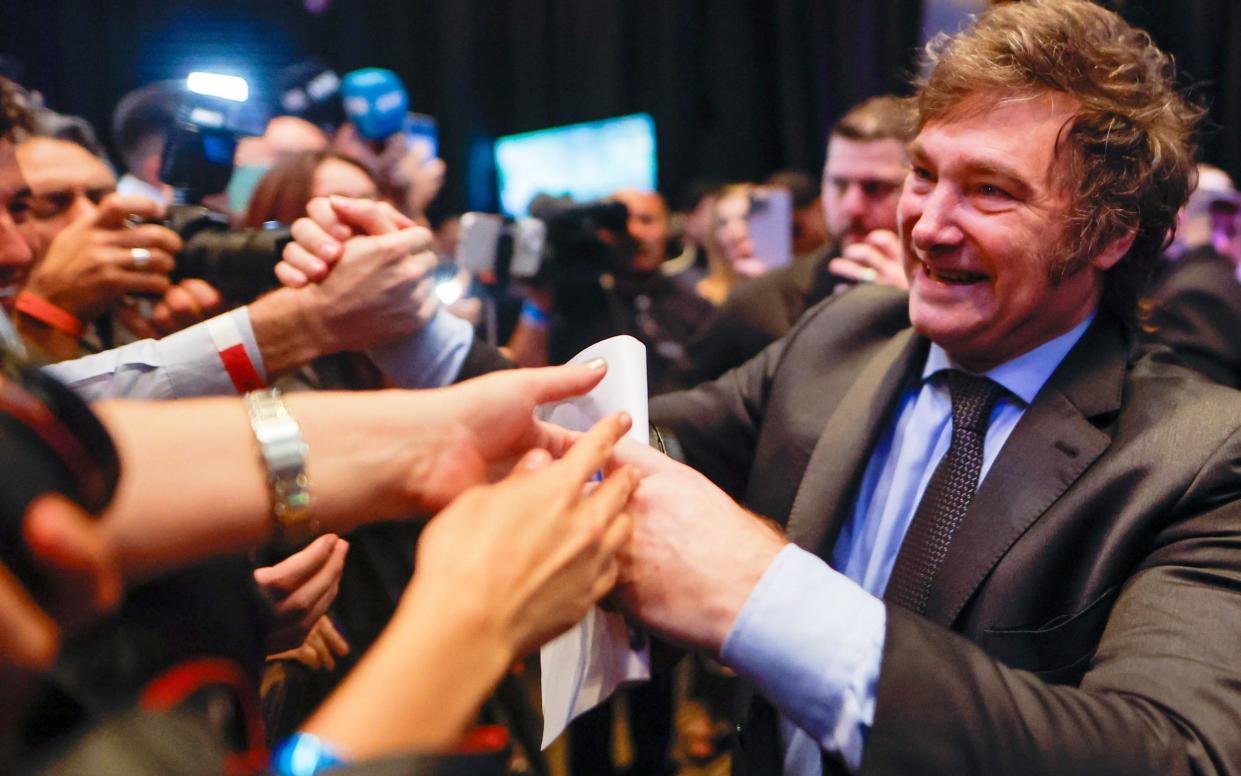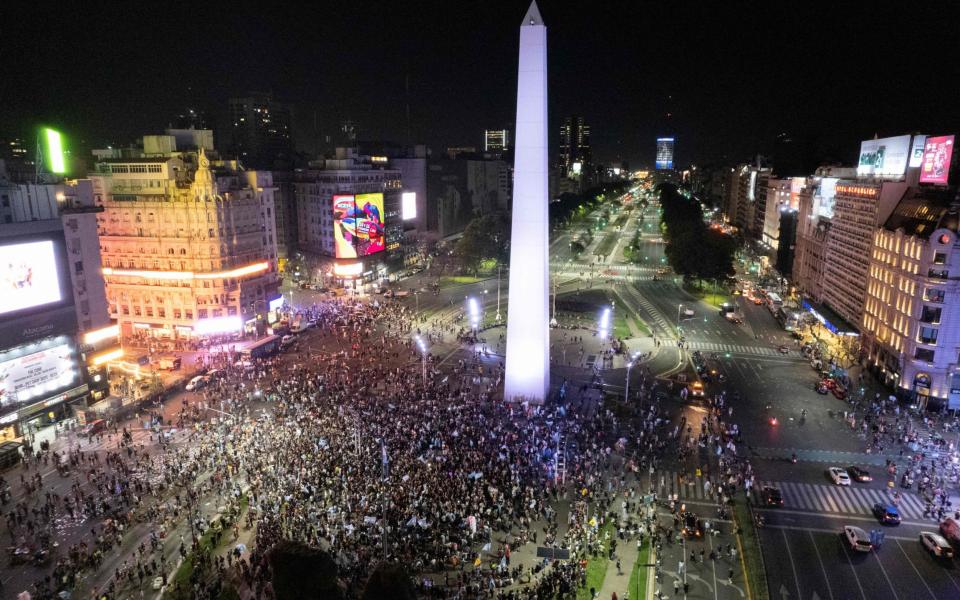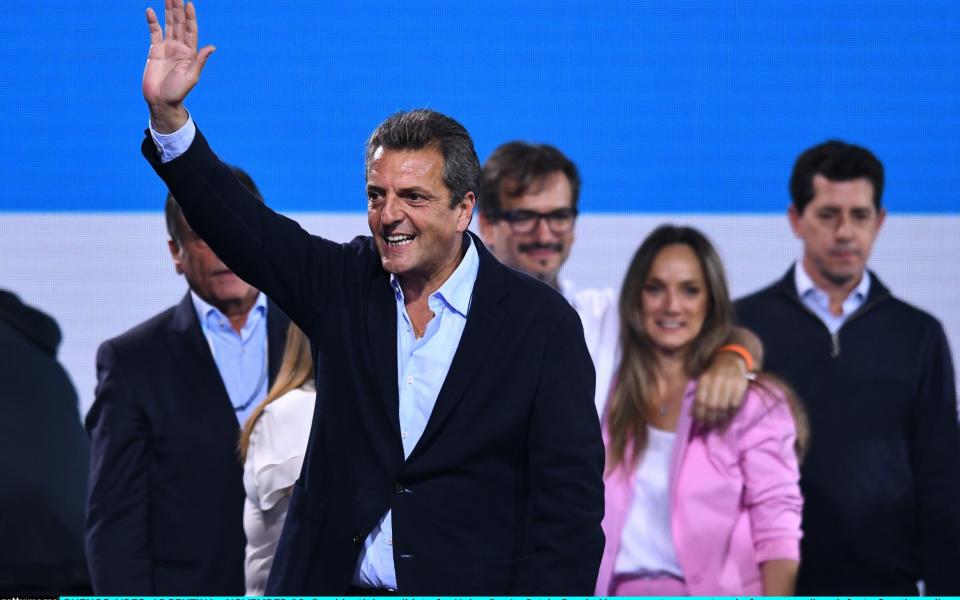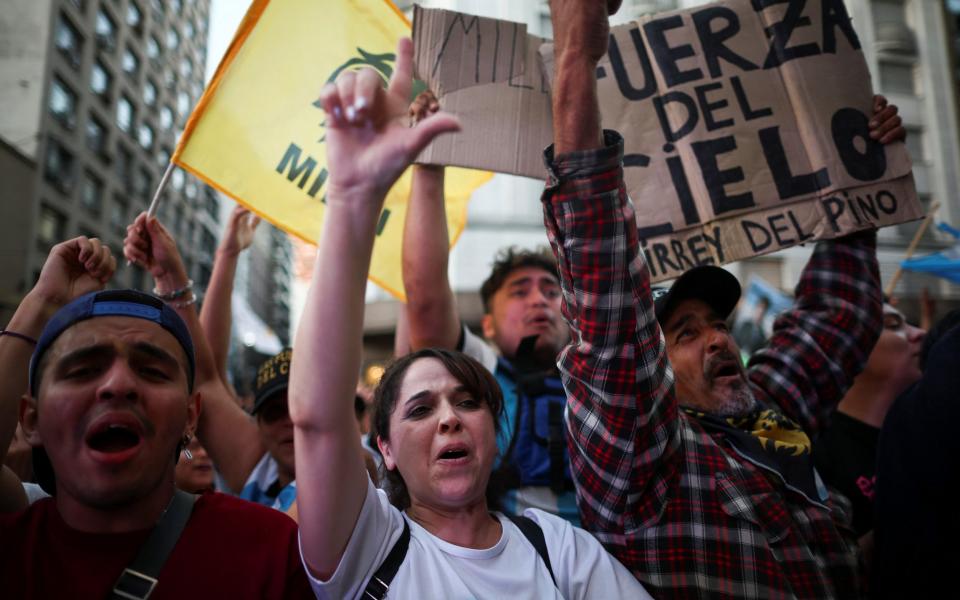Argentina votes in radical Javier Milei as next president

Argentina has voted radical hardliner Javier Milei to rule as its next president after a divisive and bitter election.
Mr Milei surged from relative obscurity to score nearly 56 per cent of the vote while Sergio Massa, the current economy minister, won only 44 per cent.
“Today the reconstruction of Argentina begins. Today is a historic night for Argentina,” Mr Milei told jubilant supporters outside of his campaign headquarters on Sunday evening.
Mr Milei – a political newcomer, former TV pundit and Trump-loving libertarian economist – pledged to make “drastic changes” to the country and smash up the economic orthodoxy after he is sworn in on December 10.
Amid rampant 143 per cent inflation and record poverty, he campaigned on dismantling the Central Bank, dollarizing the economy, slashing social subsidies and halving the number of government ministries.
Mr Milei, 53, has also heavily criticised what he calls the country’s “corrupt political caste”, and earlier in his campaign wielded a powered-up chainsaw to symbolise the cuts he plans to make.
On Sunday night, there were fewer theatrics as he delivered a victory speech that was muted in tone, but not in message.
“There is no room for gradualism, there is no room for lukewarmness or half-measures,” Mr Milei said. “There is no way back.”
He also vowed “a limited government, respect for private property and free trade” adding that the “model of decadence has come to an end”.
Thousands of supporters blasted rock music, set off fireworks, honked horns and chanted the president-elect’s popular refrain against the political elite – “out with all of them” – as they celebrated the win on Sunday night:

Police set up barricades to attempt to stem the crowd descending on Mr Milei’s headquarters.
“He represents freedom in our country. It’s a new future,” said Marcela Farvernech, aged 56, waving a yellow Gadsden flag, which has been co-opted by Milei’s Freedom Advances party.
“We are really, really happy with this result,” said Anna Roson, aged 21, standing next to a friend in a ‘Make Argentina Great Again’ t-shirt. “But we also know it’s going to create a lot of division. There will be a lot of problems in the years to come.”
The election was highly polarised, with thousands attending protests against many of Mr Milei’s proposals and comments, and voters tussling over opposing ideologies at neighbourhood rallies.
In an open letter published ahead of the election, more than 100 leading economists warned Mr Milei’s proposals could cause economic “devastation” and social chaos.
A self-proclaimed “anarcho-capitalist”, Mr Milei had sparked fierce debate for questioning the number of those killed by Argentina’s 1976-83 bloody military dictatorship. He also pledged to hold a referendum aimed at revoking abortion access, denied climate change, and said he will privatise state institutions.

In the week leading up the election, Mr Milei backtracked on some of his most controversial policies, such as loosening gun controls, in a last-ditch bid to appeal to moderate voters. His recalibration came after he scored a disappointing first-round election result in October, taking 30 per cent compared to Mr Massa’s 37 per cent, which was below pollsters’ expectations.
The two-way race was difficult to predict, with most polls – which have been notoriously wrong at every step of this year’s campaign – showing a statistical tie between the candidates. In the end, Mr Milei achieved the widest victory margin in a presidential race since the South American country’s return to democracy in 1983.
Mr Milei was aided in his bid to attract moderate voters after centre-Right candidate Patricia Bullrich was eliminated after the first round and urged her 24 per cent electorate to support Mr Milei.
Mr Massa, meanwhile, was largely seen as the continuation candidate of the current government, a deeply unpopular administration which has been blamed for the economic crisis of Latin America’s third largest economy.

Facing off against Mr Milei’s fervent rallies and chainsaw-wielding stunts, Mr Massa had attempted to portray himself as the ‘sensible’ option and had promised to create a government of national unity.
Inspired by Trump and Thatcher
In their final televised debate ahead of the elections, Mr Massa questioned Mr Milei’s views of Margaret Thatcher and the Falklands, which Argentina refers to as Las Islas Malvinas.
Mr Milei called Thatcher one of the “great leaders,” to which Mr Massa retorted, “Thatcher is an enemy of Argentina yesterday, today and always.”
Previously, Mr Milei had said he believed the future of the Falklands should be decided by its residents. During the debate he added: “We had a war – that we lost – and now we have to make every effort to recover the islands through diplomatic channels.”
Ultimately, many voters said Mr Massa was incapable of delivering the change Argentina needs.
“We need change and Massa can’t deliver it. I was born in 1977 and this is my fourth economic crisis,” said Alida Aranda, aged 46, as she waited to watch Mr Milei vote on Sunday afternoon.
“We want to untangle the corrupt system, it is not the perfect solution but we are against the ropes – between a really bad option and a slightly better one.”
When asked about Mr Milei’s controversial social policies, Mrs Aranda said: “He can’t do everything he says.”
Many Argentinians spoke of being forced to choose between “lesser of two evils”, and 24 per cent spoiled their ballot or refused to vote.
Conceding defeat on Sunday, Mr Massa said: “Argentinians have chosen another path.”

The vote also took place amid Mr Milei’s earlier allegations of possible electoral fraud, reminiscent of those from former US president Donald Trump and former Brazilian president Jair Bolsonaro, both of whom he is often compared to.
On Sunday evening, Mr Bolsanaro posted praise for the country’s new leader, saying: “Hope shines again in South America. May these good winds reach the United States and Brazil.”
Mr Trump wrote: “The whole world was watching! I am very proud of you. You will turn your country around and truly Make Argentina Great Again.”
His victory was also celebrated by billionaire tech giant Elon Musk, who posted: “Prosperity is ahead for Argentina.”
Meanwhile, Colombia’s Left-wing president Gustavo Petro, said: “The extreme right has won in Argentina … [It is] sad for Latin America.”
Voters have mixed emotions
Mr Milei has vowed to cut ties with China – one of the South American country’s biggest trading partners – aligning instead with the United States. He used his victory speech to reiterate that he will “work side by side with all nations of the free world.”
Nicknamed El Loco (the madman), Mr Milei entered politics three years ago, after finding fame as a television panelist and a youth following on social media.
While he has found success on TikTok, it remains to be seen whether Mr Milei can make a mark in the real world or even get his policies approved; he has no governors or mayors, and his party controls just 38 of 257 seats in the lower house and eight of 72 in the senate.
Analysts said he would likely need to lean on support from Mrs Bullrich’s camp, and former president Mauricio Macri, who also backed the Milei campaign.
The President-elect will also inherit a $44 billion (£35.3 billion) debt with the International Monetary Fund.

One Massa supporter said on Sunday that he does not think the new president will last “more than six months” and some Milei supporters left celebrations with more resignation than they had expected.
“I voted for Milei, but it’s difficult,” said 22-year-old Andrea, who had attended the evening celebrations but instead sat solemnly with two friends. She did not want to share her second name.
“One option was to vote for the same people, who we have had for many many years. I voted for change. But I’m worried, I don’t know if it was right.”


